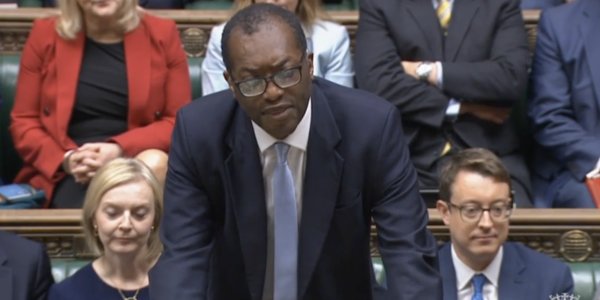23 SEPTEMBER 2022 | NEWS
The Chancellor of the Exchequer delivered his widely-anticipated ‘mini-Budget’ in the House of Commons this morning, setting out the new Government’s plan for dealing with the cost-of-living crisis.
Kwasi Kwarteng, who was only recently made Chancellor by new Prime Minister Liz Truss following her successful leadership campaign, delivered a ‘mini-Budget’ full of tax cuts and deregulation which, according to the Government, will stimulate economic growth and boost the economy. The Government hopes that the economic growth will ease the cost-of-living crisis for families across the country.
Amongst the pledges made by Mr Kwarteng was the promise to cancel the planned increase on corporation tax and cuts to personal income tax. He further promised to cut stamp duty and reverse the planned National Insurance increase introduced by his predecessor, Rishi Sunak. The cap on bankers’ bonuses was also scrapped.
Mr Kwarteng began his address today by telling MPs: “Growth is not as high as it needs to be, which has made it harder to pay for public services, requiring taxes to rise.
“This cycle of stagnation has led to the tax burden being forecast to reach the highest levels since the late 1940s. We are determined to break that cycle. We need a new approach for a new era focused on growth.
“That is how we will deliver higher wages, greater opportunities and sufficient revenue to fund our public services, now and into the future. That is how we will compete successfully with dynamic economies around the world.
“That is how we will turn the vicious cycle of stagnation into a virtuous cycle of growth. We will be bold and unashamed in pursuing growth – even where that means taking difficult decisions. The work of delivery begins today.”
On the cancellation of the planned increase in corporation tax announced by the previous Government, Mr Kwarteng said: “This will plough almost £19 billion a year back into the economy. That’s £19 billion for businesses to reinvest, create jobs, raise wages, or pay the dividends that support our pensions.”
Additionally, it was announced that the basic rate of income tax would be cut to 19p from 2023, with the highest 45p band to be scrapped altogether. The Chancellor said: “From April 2023, we will have a single higher rate of income tax of 40%. This will simplify the tax system and make Britain more competitive.
“It will reward enterprise and work. It will incentivise growth. It will benefit the whole economy and the whole country.
“And, Mr Speaker, after all, this only returns us to the same top rate we had for 20 years – including the entire time the Opposition was last in power – bar one month.”
The level at which families will begin to pay stamp duty has been doubled £250,000 and first-time buyers will also receive stamp duty relief, with their threshold rising to £425,000. The Chancellor said: “Home ownership is the most common route for people to own an asset, giving them a stake in the success of our economy and society.
“So, to support growth, increase confidence and help families aspiring to own their own home, I can announce that we are cutting stamp duty.
He stated: “We’re going to increase the value of the property on which first-time buyers can claim relief, from £500,000 to £625,000.”
But there was also a warning from the Chancellor to people on Universal Credit, who will see their benefits reduced if they do not meet the job-searching requirements set out for them in exchange for state aid.
The Treasury estimates that the full package of measures will save 28 million taxpayers around £330 per year, with 920,000 businesses also set to save around £10,000 per year on average.
But the Shadow Chancellor, Rachel Reeves, criticised the ‘mini-bBudget’, saying: “The Chancellor has confirmed that the costs of the energy price cap will be funded by borrowing, leaving the eye-watering windfall profits of the energy giants untaxed.
“The oil and gas producers will be toasting the Chancellor in the boardrooms as we speak, while working people are left to pick up the bill.
“Borrowing is higher than it needs to be, just as interest rates rise. And yet the Chancellor refuses to allow independent economic forecasts to be published, which would show the impact of this borrowing on our public finances and growth, and on inflation.
“It is a Budget without figures, a menu without prices. What has the Chancellor got to hide?”
Other polices announce in the ‘mini-Budget’ included creating new investment zones in areas such as the West Midlands and Tees Valley, with the Chancellor announcing further deregulation for infrastructure and housing projects. The Government will also scrap VAT for tourists coming to the UK, and is freezing alcohol duty.
In further announcements today, the Chancellor added that a sunset clause would be introduced for all EU-derived law, to take effect from the end of 2023. The Government says this move is to simplify legislation and thereby reduce the regulatory burden on businesses to spur further growth.
In the financial world, the markets are remaining cautious, with the pound falling to its lowest rate against the dollar for 37 years.
The full details of the Government’s ‘Growth Plan 2022’ can be read here:
CCS207_CCS0822746402-001_SECURE_HMT_Autumn_Statement_2022_BOOK_Web_Accessible
























